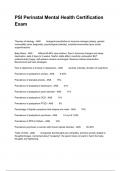PSI
Perinatal
Mental
Health
Certification
Exam Theories
of
etiology
-
ANS
biological
sensitivities
to
hormone
changes
(sleep),
genetic
vulnerability
(prior
diagnosis),
psychological
(identity),
social/environmental
(poor
social
support/racism)
Baby
Blues
-
ANS
Affects
60-80%
new
mothers.
Due
to
hormone
changes
and
sleep
deprivation.
lasts
2
days
to
2
weeks.
Tearful,
labile
affect,
reactivity,
exhaustion
BUT
predominantly
happy,
self-esteem
remains
unchanged.
Resolves
without
intervention.
Recommend
self
care
strategies.
How
to
determine
is
it
blues
or
depression
-
ANS
severity,
intensity,
duration
of
symptoms
Prevalence
of
postpartum
anxiety
-
ANS
8-20%
Prevalence
of
prenatal
anxiety
-
ANS
15%
Prevalence
of
postpartum
depression
-
ANS
21%
Prevalence
of
postpartum
panic
disorder
-
ANS
11%
Prevalence
of
postpartum
OCD
-
ANS
11%
Prevalence
of
postpartum
PTSD
-
ANS
9%
Percentage
of
bipolar
symptoms
that
relapse
w/o
meds
-
ANS
70%
Prevalence
of
postpartum
psychosis
-
ANS
1-2
out
of
1,000
Prevalence
of
PPD
in
fathers
-
ANS
10%
Prevalence
psychosis
in
women
with
known
bipolar
disorder
-
ANS
20-30%
Traits
of
OCD
-
ANS
recognizes
that
thoughts
are
unhealthy,
extreme
anxiety
related
to
thoughts/images,
concerned
about
"snapping".
the
parent
does
not
want
to
harm
the
baby,
thoughts
are
frightening. Traits
of
psychosis
-
ANS
does
not
recognize
actions/thoughts
are
unhealthy,
may
seem
to
have
less
anxiety
when
indulging
in
thoughts/behaviors,
no
insight
about
distortion
of
thoughts,
parent
has
delusional
beliefs
about
the
baby,
thoughts
of
harming
the
baby
are
ego-syntonic
Traits
of
PTSD
-
ANS
intrusive
thoughts
(flashbacks),
avoidance,
negative
cognitions
and
mood,
arousal
(sleep
disturbance,
poor
concentration,
aggression,
hypervigilance)
maternal
mortality-all
women
-
ANS
1,200
a
year
or
14.4
per
100,000
maternal
mortality-black
women
-
ANS
43.5
per
100,000
Bipolar
1
Disorder
-
ANS
a
type
of
bipolar
disorder
marked
by
at
least
one
lifetime
full
manic
and
major
depressive
episodes
Hypomania
-
ANS
A
mild
manic
state
in
which
the
individual
seems
infectiously
merry,
extremely
talkative,
charming,
and
tireless.
up
to
4
days
in
length
mania
-
ANS
a
mood
disorder
marked
by
a
hyperactive,
wildly
optimistic
state-function
is
impaired.
can
last
7
days
prevalence
of
first
diagnosis
of
bipolar
disorder
postpartum
-
ANS
50%
Risk
factors
for
postpartum
psychosis
-
ANS
History
of
bipolar
or
psychotic
disorder,
first
pregnancy,
family
history,
recent
discontinuation
of
psychotropic
medication
Postpartum
psychosis
symptoms
-
ANS
onset-2
weeks
postpartum,
poor
concentration,
disorientation,
agitation,
aloof,
lack
of
self
care,
elated/labile
mood,
rambling
speech,
thought
broadcasting/delusion
of
grandiosity,
disorganized
thoughts,
flight
of
ideas,
hallucinations
reducing
risk
of
postpartum
psychosis
-
ANS
stay
on
bipolar
medication,
treat
immediately
in
women
with
history
of
psychosis
and
bipolar,
good
sleep
is
essential
Evidence
based
risk
factors
for
PMADS
-
ANS
previous
PMADS
(family
history,
personal
history,
symptoms
during
pregnancy),
history
of
mood/anxiety
disorders
(personal
or
family
history
of
depression,
anxiety,
OCD,
eating
disorders,
bipolar
disorders),
significant
mood
reactions
of
hormonal
changes
(puberty,
PMS,
hormonal
birth
control)
More
evidence
based
risk
factors
for
PMADS
-
ANS
endocrine
dysfunction
(diabetes,
thyroid
imbalance,
fertility
challenges),
social
factors
(IPV,
low
support,
financial
stress,
racism),
high
stress
parenting
(military
families,
adolescent
parents,
parents
of
multiples,
single
parents)
Exacerbating
factors
of
postpartum
depression
-
ANS
pain,
lack
of
sleep,
abrupt
discontinuing
of
breast
feeding,
childcare
stress,
relationship
stress,
losses,
history
of
childhood
sexual
abuse,
complicated
pregnancy,
health
changes
in
baby
or
parents,
temperament
of
baby,




